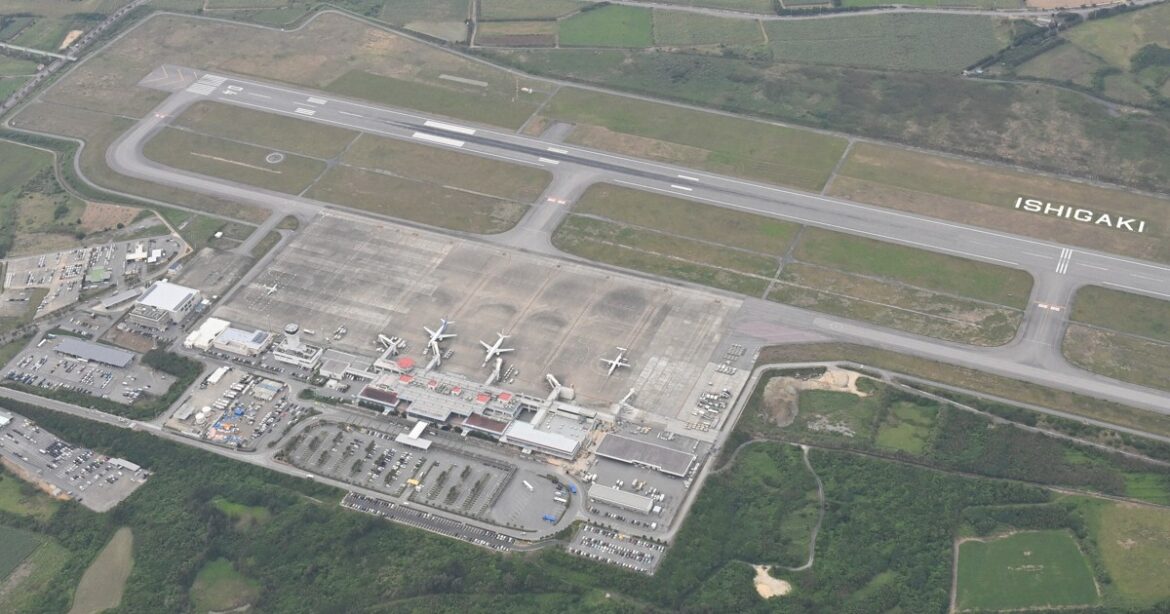
New Ishigaki Airport is seen in Ishigaki, Okinawa Prefecture, in this March 10, 2022, file photo taken from the Mainichi Shimbun aircraft “Kibo.” (Mainichi)
FUKUOKA — The chief of the aviation weather station on Ishigaki Island, Okinawa Prefecture, was under the influence of alcohol while they were on duty at the station that is tasked with monitoring the weather for the local airport, the Mainichi Shimbun has learned.
The Japan Meteorological Agency (JMA) and other sources revealed the inappropriate behavior at the Ishigaki Aviation Weather Station. As the observation data itself was free of problems, there was no impact on the flight operations at New Ishigaki Airport at the time, but if erroneous information had been communicated, it could have threatened aviation safety. An expert criticized the incidents, calling them “a situation beyond expectation and belief.”
Aviation weather stations are facilities where private businesses and local governments observe the weather for airports on commission from the JMA. Weather data obtained at those local stations is reported to the JMA, as well as to the transport ministry’s regional civil aviation bureaus overseeing airports in their jurisdiction, and to airline companies. According to the JMA, there are 68 aviation weather stations across Japan, of which 48 are outsourced to the private sector.
The predecessor to the Ishigaki Aviation Weather Station was established in 1967, and since 1969 had been tasked with weather observations for the former Ishigaki Airport. The current duties for New Ishigaki Airport began in March 2013 upon the airport’s inauguration. While the JMA initially sent its staff to the station, operations were subsequently entrusted to the Aerodrome Support and Aeronautical Service (ASAS), a Tokyo-based general incorporated foundation, in April 2014.
As of late March this year, four personnel worked at the Ishigaki station including its chief. On weekdays, three observers were on duty between 7:30 a.m. and 9 p.m., while two were in charge on Saturdays, Sundays and holidays during the same time. In the event of emergencies at night, off-duty standby crew took charge of the tasks.
There are three types of observation duties: “constant monitoring” to pay attention to the weather in and around the airport, “fixed-time monitoring,” and “special observations.” The third one is carried out when the weather conditions have drastically changed or upon inquiries from airline carriers for use as references for their takeoffs and landings.
According to the JMA and other sources including internal documents obtained by the Mainichi, the head of the Ishigaki Aviation Weather Station had drunk alcohol before taking a nap at the facility in March 2023. In February 2024, the same chief drove to the station drunk for work and was engaged in special nighttime observations while intoxicated.
According to sources familiar with the situation, when the need for special observation tasks arises, such as for emergency transport at night, automatic monitoring data is normally used. But if the devices break down, observation crews have to visually monitor the weather, making it impossible to conduct accurate observations in a tipsy state. Furthermore, in cases where data cannot be sent due to system glitches, observers communicate with relevant parties over the phone or through other means, meaning that being drunk would affect their operations.
If the monitoring data is inaccurate or not sent properly, airport traffic controllers and airline companies cannot make flight decisions during bad weather, affecting safe takeoffs and landings. New Ishigaki Airport currently hosts direct flights to and from major domestic airports in Tokyo, Osaka, Nagoya and elsewhere. In fiscal 2023, a record 2.61 million people used domestic flights at the airport, meaning that the impact of any inaccuracies would be enormous.

The building housing the Ishigaki Aviation Weather Station is seen in Ishigaki, Okinawa Prefecture, in this photo provided by the Japan Meteorological Agency.
According to the JMA, the agency launched an investigation after there was whistleblowing about the DUI and other cases in October 2024. In addition to the station chief’s drinking issues, it also came to light that the chief and three observation staff had repeatedly left the office early even though they had no specific reasons to do so between April and October 2024.
In response, the ASAS admonished the station chief on disciplinary grounds in March 2024 over the drinking incidents, and admonished and cut the bonuses of the chief and three observation crew that October for leaving work early.
According to the ASAS and the JMA, they could not identify these problems earlier as there were no issues with the observation data, nor were there any reporting delays. The authorities said they will introduce recurrence prevention measures such as requiring stricter reporting of alcohol testing for observation crews.
An ASAS representative explained, “We meted out the punishments after making comprehensive judgments. We would have to say the station staff had poor awareness of compliance.” A JMA official said, “We take these cases seriously and will provide guidance on effective recurrence prevention measures.”
‘Beyond expectation and belief’: expert
According to Hiroyuki Kobayashi, an aviation critic and former Japan Airlines Co. pilot, if incorrect weather data is communicated to a pilot due to weather station crew members being inebriated, it may affect safe flight operations during inclement weather, or even if the weather is good, the pilot may cancel landings due to the wrong belief that the weather is bad. Regarding the Ishigaki station cases, Kobayashi stated, “They are utterly beyond expectation and belief as weather observation plays a key role in supporting safe aircraft operations.”
(Japanese original by Maika Hyuga, Kyushu News Department)
* * *
The original Japanese article was written based on information received via “Tsunagaru Mainichi Shimbun,” a submission form for journalism on demand. If there are any subjects you’d like us to cover, please contact us via: https://mainichi.jp/tsunagaru


AloJapan.com